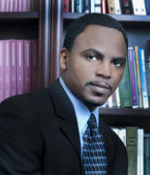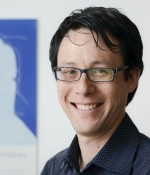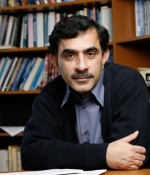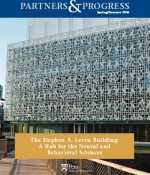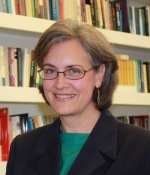2017
Research Describes Missing Step in How Cells Move Their Cargo
Every time a hormone is released from a cell, every time a neurotransmitter leaps across a synapse to relay a message from one neuron to another, the cell must undergo exocytosis. This is the process responsible for transporting cellular contents via lipid-encapsulated vesicles to the cell surface membrane and then incorporating or secreting them through membrane fusion. Insights into this cellular cargo transport system won three Americans the Nobel Prize in 2013.
Political Science Professor Chosen as Penn Fellow
Daniel Gillion, Presidential Associate Professor of Political Science in Penn Arts and Sciences, has been included in the ninth cohort of Penn Fellows announced by University of Pennsylvania Provost Vincent Price and Vice Provost for Faculty Anita Allen.
Jay Gottfried Appointed Penn Integrates Knowledge Professor
Jay Gottfried has been named the University of Pennsylvania’s 18th Penn Integrates Knowledge University Professor, effective July 1, 2017. The announcement was made today by Penn President Amy Gutmann and Provost Vincent Price.
Tomson Receives Charles E. Kaufman Foundation Grant for Energy Research
Neil Tomson, an assistant professor of chemistry in Penn Arts and Sciences, has received a grant from the Charles E. Kaufman Foundation, one of The Pittsburgh Foundation’s charitable entities, for his research on coordination chemistry and catalysis using molecular-scale electric fields.
Paleobiologist Lauren Sallan Selected as a 2017 TED Fellow
Lauren Sallan, an assistant professor in the Department of Earth and Environmental Science, has been selected as a TED Fellow, joining a class of 15 innovators from around the world who will deliver a talk on the TED stage in April in Vancouver, B.C.
Charles, Duckworth Named to Endowed Chairs in Penn Arts and Sciences
Dean Steven J. Fluharty is pleased to announce the appointment of two faculty members in Penn Arts and Sciences to endowed chairs.
Stephen A. Levin Building Wins Architectural Award
The Stephen A. Levin Building at the University of Pennsylvania has received the Gold/Honor Award from the American Institute of Architects–Potomac Valley. One of the judges called the structure, “A very handsome building, and our favorite from the very beginning. It is filled with delightful spaces that encourage collegiality. It is a beautifully crafted, nicely proportioned, and a respectful building.”
David Brownlee Wins Lifetime Achievement ‘Globy’
David Brownlee has received a lifetime achievement award from the Global Philadelphia Association for his contributions to the growth of the city. Brownlee is the Frances Shapiro-Weitzenhoffer Professor of the History of Art. He is a historian of modern architecture and urbanism in Europe and America and a Fellow of the Penn Institute for Urban Research.
Modern Language Association of America Awards Book Prizes to Two Penn Arts and Sciences Professors
The Modern Language Association of America has awarded prizes for scholarly work to Kathryn Hellerstein, associate professor of Germanic languages and literatures, and Paul Saint-Amour, professor of English.
2016
Researchers Expand Research on Simplifying Recycling of Rare-earth Metals
In a previous study, researchers pioneered a process that could enable the efficient recycling of two rare-earth metals, neodymium and dysprosium, which are found in the small, powerful magnets in many high-tech devices.
MacArthur Foundation Features Penn’s #100andChange Proposal (Video)
Two Penn professors are proposing to change the world. You can show your support by watching their video, currently featured on the MacArthur Foundation’s web site, and sharing your comments on Twitter, Facebook, and Instagram using the hashtag #100andChange: https://www.macfound.org/press/article/look-100-change-through-video/ (third video).
Paul Saint-Amour Awarded 2016 Modernist Studies Association Book Prize
Paul Saint-Amour, a professor of English at Penn Arts and Sciences, has won the Modernist Studies Association Book Prize for 2016 for his most recent book, Tense Future: Modernism, Total War, Encyclopedic Form. The prize is awarded annually to a book published in the previous year that has made a significant contribution to modernist studies.
Fish Fossils Reveal How Tails Evolved, Penn Professor Finds
Despite their obvious physical differences, elephants, lizards and trout all have something in common. They possess elongated, flexible structures at the rear of their bodies that we call tails. But a new study by a paleobiologist reveals that the tails of fish and the tails of tetrapods, or four-limbed animals, are in fact entirely different structures, with different evolutionary histories.
Three Endowed Chairs Named in Penn Arts and Sciences’ Department of History
Dean Steven J. Fluharty is pleased to name three faculty members to endowed chairs in Penn Arts and Sciences.
Professor’s Research on Mass Incarceration Informs Documentary, Museum Exhibit
After studying the origins and politics of mass incarceration, Marie Gottschalk has taken her research one step further by introducing the idea of a “carceral state” with millions of people in prison, on probation or on parole who are still “detained” through monitoring.
Chemists Uncover New Information About a Protein Linked to Alzheimer’s
Although the protein tau, which is associated with Alzheimer’s and other neurodegenerative diseases, has been heavily studied for decades, its role in maintaining cell function is poorly understood.
Announcement from Dean Fluharty on the College Dean
During the spring semester of 2017, Dennis DeTurck will be on sabbatical leave from his roles as Stephen A. Levin Dean of the College of Arts and Sciences, Robert A. Fox Leadership Professor, and Professor of Mathematics. His leave from the College deanship will be a short break from a role in which Dennis has served with extraordinary devotion since 2005, as an energetic champion for undergraduate education in the liberal arts at Penn.
Power Poses Don’t Help and Could Potentially Backfire
The idea behind power poses, that if you stand in a “powerful” position, broad posture, hands on hips, shoulders high and pushed back, you will suddenly feel psychologically and physiologically stronger, is intuitively appealing, especially for people without much confidence. The problem is that it’s simply not true, according to researchers Coren Apicella, an assistant professor in the psychology department, and Kristopher Smith, a fourth-year psychology Ph.D. student.
Penn Fels Policy Research Initiative Announces Fall Interdisciplinary Grants
The Fels Policy Research Initiative in the School of Arts & Sciences at the University of Pennsylvania has announced eight collaborative grant recipients. Each will be awarded as much as $15,000 in support of three new working groups and five conferences, designed to further interdisciplinary partnerships.
Researchers Receive $1.1 Million NSF Grant to Protect Internet Security
Ted Chinburg, a professor of mathematics, is part of a team that is trying to break the internet. But only so it can protect it.
Researchers Uncover a New Way Heat Travels Between Molecules
A new model, developed by Penn chemists, could be the first step towards better harnessing heat energy to power nanoscale devices. Abraham Nitzan, professor of chemistry , and Galen Craven, a postdoc in his lab, used new information about how to measure temperature on a nanoscale to revisit the mechanism of heat transfer. They created a model to find out how a temperature gradient affects molecular interaction, focusing in on the process of electron transfer.
A Message from Dean Steven J. Fluharty
The emotionally charged election cycle has exposed the harsh reality that our nation is deeply divided. These divisions were brought home forcefully by the disturbing social media attacks on Penn’s Black freshmen last Friday. The language and symbols of intimidation are an assault not only against the students targeted but against the values that Penn Arts and Sciences holds in highest esteem.
Restoring Active Memory Project Releases Extensive Human Brain Dataset
A project aimed toward building a device that helps improve memory for patients with memory disorders has reached an important milestone.
Team Receives DARPA Support to Develop ‘Next Generation’ Social Science
A scientific team led by Penn faculty has received an award from the Defense Advanced Research Projects Agency (DARPA) to develop and validate reproducible methods for studying human social behavior.
Inaugural Digital Humanities Fellows Study Art, Urban History, and Media
For senior Konhee Chang, Kandinsky’s “Circles in a Circle” painting sings. Or at least it will soon.Chang is about halfway through a project to turn the famous painter’s work into a musical score. Each of the 50 or so circles and lines will be assigned a musical note according to Kandinsky’s theories on sound and image, and the ultimate tune will depend on which order the viewer chooses to “play” those notes, similarly to how a painter selects the sequence to paint.
Michael Leja Explores the Art of Elections
Michael Leja, a history of art professor and chair of the history of art graduate group says today’s standard of hyper-mediatized presidential campaigns started with the United States presidential election of 1840, the first in which images played a significant role.Leja studies the visual arts in various media, including painting, sculpture, film, photography, prints and illustrations, from the 19th and 20th centuries.
Astronomers Discover New Potential Dwarf Planet
It’s not every day that scientists get to say they have discovered a new planet in our solar system, but that day arrived this past July for Masao Sako, an associate professor of physics and astronomy, and Gary Bernstein, the Reese W. Flower Professor of Astronomy and Astrophysics.
Devesh Kapur Co-authors Book on Success of America’s ‘Other One-Percenters’
A new book examines the growth and success of the Indian-American community in the United States, both Indian-born and American-born.The Other One Percent: Indians in America is a collaborative book written by Devesh Kapur, director of the Center for Advanced Study of India and a professor of political science.
Mathematicians Win $10 Million Grant to Prove Homological Mirror Symmetry
A team of researchers led by Professors of Mathematics Tony Pantev and Ron Donagi have received a $10 million Simons Collaboration Grant to prove the Homological Mirror Symmetry Conjecture, one of mathematics’ outstanding open problems. Solving this has potential applications in fields from particle physics to geometry.
Study Finds Straightforward Way to Model Growth of Vein Networks
A new study by Eleni Katifori, assistant professor of physics and astronomy, and Henrik Ronellenfitsch, a postdoc in her lab, describes how a simple rule guides the development of the vasculature in both animals and plants.The researchers used mathematical modeling to show that this rule, known as adaptive feedback, can produce the most efficient possible network of veins for any organism.Their findings were published in Physical Review Letters.
Penn’s EnerFront Sparks New Ideas on Energy Sustainability
A new collaboration, EnerFront, is leading a series of forums through the fall semester to invite researchers from different disciplines to talk about energy. The concept originated with Reto Gieré, professor and chair of the Department of Earth and Environmental Science, and the department’s research program manager, Svetlana Milutinović. They hope the initiative, now in its second semester, will continue building a community of researchers from around the University.
In Memoriam: Professor Richard R. Beeman
Richard R. Beeman, John Welsch Centennial Professor of History, Emeritus, at the University of Pennsylvania, died on September 5, 2016, at the age of 74. Beeman was born in Seattle, Washington, in 1942 and was raised in Long Beach, California. He received his BA from the University of California, Berkeley (1964); an MA from the College of William and Mary (1965); and a PhD under the supervision of Daniel Boorstin from the University of Chicago (1968).
Witnessing Geology’s Impact Firsthand With Penn in the Alps
As part of the Penn Summer Abroad program, the participants in the 10-day “Penn in the Alps” course received an intellectually and physically rigorous introduction to a region with geological, biological, historical, political, and cultural traits found nowhere else.
'Being and Learning in a Digital Age’ Examines Online Learning
As higher education institutions wrestle with the future of massive open online courses, or MOOCs, the University of Pennsylvania will host the third annual conference focused on online learning, Oct. 6-7.
Penn Arts and Sciences Welcomes New Faculty for 2016-2017
Penn Arts and Sciences has appointed 26 new members to its standing faculty for the 2016-2017 academic year. The School is pleased to welcome:
Biologists Reveal How Sleep Deprivation Harms Memory
A study in mice has, for the first time, shown that five hours of sleep deprivation leads to a loss of connectivity between neurons in the hippocampus, a region of the brain associated with learning and memory. The study is to be published in the journal eLife.
Stigma of Record Stays with Individual, Regardless of Crime Type, Conviction
What collateral damage comes from having a criminal record?
Nicholas Sambanis Named Presidential Distinguished Professor
Nicholas Sambanis has been named a Presidential Distinguished Professor in the School of Arts and Sciences’ Department of Political Science. Sambanis, who joined the department effective July 1, is among the world’s leading scholars of violent civil wars, secessionist conflicts, and strategies for conflict resolution and peace-building.
People Prefer Explanations That Refer to a More Fundamental Science
Why do some science news stories catch our eye, even if they use exaggerated, irrelevant, or inaccurate information?
Rogers Smith Elected to the American Philosophical Society
Rogers Smith, Christopher H. Browne Distinguished Professor of Political Science; chair of the Penn Program on Democracy, Citizenship, and Constitutionalism; and associate dean for social sciences, has been selected for membership in the American Philosophical Society.
Julie Nelson Davis of Penn Collaborates With Smithsonian
Art historian Julie Nelson Davis is partnering with the Smithsonian’s Freer|Sackler Galleries on two projects in Washington, D.C.“It’s like a dream come true,” said Davis, a professor in the History of Art Department and the senior consulting curator at the Smithsonian’s Museums of Asian Art.
Spring/Summer 2016 Issue of “Partners and Progress” Highlights Alumni Community
Twice a year, Partners and Progress, the publication dedicated to highlighting Penn Arts and Sciences’ vibrant and generous community of alumni, parents, and friends, sheds light on exciting new developments at the School. In this Spring/Summer 2016 issue we take a tour of the new Stephen A. Levin Building, a hub for the neural and behavioral sciences; report on alumni events; and remember Overseer Chair and Penn Trustee David Silfen, C'66.
Having Well-connected Friends Benefits Female Baboons, Study Finds
In humans, it’s well documented that having a healthy social life is associated with better physical health. The same is true for baboons: females who have close bonds with other females live longer and have greater reproductive success.
Study Models How the Immune System Might Evolve to Conquer HIV
It has remained frustratingly difficult to develop a vaccine for HIV/AIDS, in part because the virus, once in our bodies, rapidly reproduces and evolves to escape being killed by the immune system.“The viruses are constantly producing mutants that evade detection,” says Joshua Plotkin, professor of biology. “A single person with HIV may have millions of strains of the virus circulating in the body.”
Former CEO of Philadelphia Water Joins Penn Research Centers as Senior Fellow
The Fels Policy Research Initiative at Penn Arts and Sciences and the Kleinman Center for Energy Policy at PennDesign the jointly welcome Howard Neukrug, who will serve both institutions as a senior fellow during the 2016-2017 academic year. Neukrug is the former CEO of Philadelphia Water and a senior fellow at the U.S. Water Alliance.
Beth Simmons Appointed Penn Integrates Knowledge Professor
President Amy Gutmann and Provost Vincent Price are pleased to announce the appointment of Beth Simmons as the University of Pennsylvania’s 18th Penn Integrates Knowledge University Professor, effective July 1, 2016. A world-renowned authority on international relations and human rights, Simmons is the Andrea Mitchell University Professor, with joint faculty appointments in the Law School and the Department of Political Science in Penn Arts and Sciences.
Doctoral Candidate Studies Economic ‘Dynamic Game Theory’
When you want to buy a new cell phone or eat out, how do you decide which brand to purchase or which restaurant to dine in? According to Daniel Hauser, a fifth-year doctoral candidate in the Department of Economics, it has to do with motivation on the part of the business and perception on the part of the consumer. An organization must decide whether to promote strong products or defend against attacks on weak ones.
Animals ‘Inherit’ Their Social Network From Their Mothers
In a newly published study in the journal Nature Communications, Erol Akçay, an assistant professor of biology, and Amiyaal Ilany, a postdoctoral researcher, developed a mathematical model of the way social networks arise in animal populations.
Chemists Establish Fundamentals of Ferroelectric Materials
Ferromagnetic materials are useful because their magnetic polarization makes them rotate to align with magnetic fields. Since external electric fields can reorient the electric polarization of these materials, they are ideal for certain memory applications, such as stored-value cards used in mass-transit systems.

